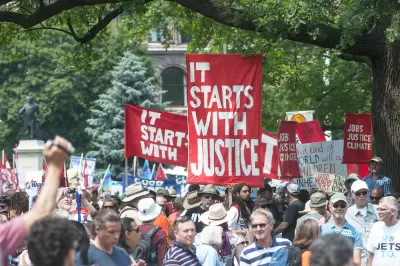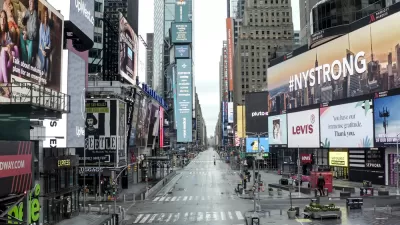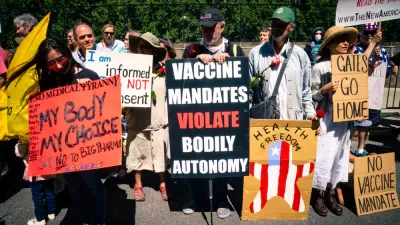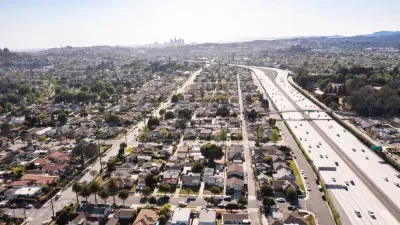Ecofascism, or the "promotion of authoritarian, facist [sic] ideologies for environmental good," is mistaken for virtue signaling as the coronavirus sweeps the globe.

Ecofascism (or, as Sierra Garcia describes it in an article for Grist, the dark side of the environmental movement) has become more visible and vocal as the world reels from the effects of the coronavirus pandemic.
"Minimizing or even encouraging human death and suffering so long as it helps the environment is an excellent example of the dark ideology — and yet variations on the coronavirus-is-good-for-the-climate theme have been cropping up more and more as the virus spreads," writes Garcia.
The purpose of Garcia's article is to highlight the shortcomings of this worldview, and the kind of social media messages that might inadvertently propagate the darker ideology as a misdirected expression of solidarity for the environment.
This stance has some serious flaws, like its disregard of the disproportionate impact different people and societies have on the environment, and its questionable assumption that human society and 'the planet' are somehow discrete and utterly separate actors. But the most disturbing facet of this argument is how it echoes strains of the environmentalist movement that have advocated for reducing nonwhite, non-Western populations.
Numerous examples of the racist connections between environmentalism, conservation, and population follow, along with a call to action to call out ecofascism when its identified in public and social media.
FULL STORY: ‘We’re the virus’: The pandemic is bringing out environmentalism’s dark side

Alabama: Trump Terminates Settlements for Black Communities Harmed By Raw Sewage
Trump deemed the landmark civil rights agreement “illegal DEI and environmental justice policy.”

Planetizen Federal Action Tracker
A weekly monitor of how Trump’s orders and actions are impacting planners and planning in America.

The 120 Year Old Tiny Home Villages That Sheltered San Francisco’s Earthquake Refugees
More than a century ago, San Francisco mobilized to house thousands of residents displaced by the 1906 earthquake. Could their strategy offer a model for the present?

In Both Crashes and Crime, Public Transportation is Far Safer than Driving
Contrary to popular assumptions, public transportation has far lower crash and crime rates than automobile travel. For safer communities, improve and encourage transit travel.

Report: Zoning Reforms Should Complement Nashville’s Ambitious Transit Plan
Without reform, restrictive zoning codes will limit the impact of the city’s planned transit expansion and could exclude some of the residents who depend on transit the most.

Judge Orders Release of Frozen IRA, IIJA Funding
The decision is a victory for environmental groups who charged that freezing funds for critical infrastructure and disaster response programs caused “real and irreparable harm” to communities.
Urban Design for Planners 1: Software Tools
This six-course series explores essential urban design concepts using open source software and equips planners with the tools they need to participate fully in the urban design process.
Planning for Universal Design
Learn the tools for implementing Universal Design in planning regulations.
Clanton & Associates, Inc.
Jessamine County Fiscal Court
Institute for Housing and Urban Development Studies (IHS)
City of Grandview
Harvard GSD Executive Education
Toledo-Lucas County Plan Commissions
Salt Lake City
NYU Wagner Graduate School of Public Service





























